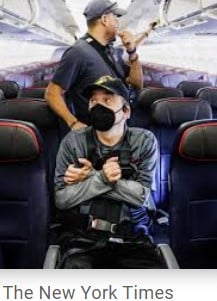
In December, the Department of Transportation (DOT) adopted rules aimed at protecting the safety of airline passengers with disabilities. This rulemaking addresses many of the concerns and suggestions raised by the Society in comments submitted to the agency this summer. The rule aims to make air travel safe and dignified for people with disabilities.
To start, the rulemaking requires enhanced annual training for airline personnel who physically assist passengers with mobility disabilities or handle mobility devices. This training must be enacted by June 17, 2026. The rule clarifies that airlines must provide prompt enplaning, deplaning, connecting and terminal moving assistance for passengers who have disabilities.

This extends to passengers who use a boarding chair. Airlines are required to deplane passengers who use boarding chairs after the last passenger has exited the plane, and (upon request) have their personal chair as close to the aircraft door as possible. Airlines are required to notify a passenger when their mobility device is loaded and unloaded onto a plane. Notification for boarded devices must happen before the cabin door closes.
The rule also looks to address damaged and mishandled mobility devices. The rule clarifies that there is a presumption that if a wheelchair or assistive device is not returned to the passenger in the same condition as the airline received it, then the airline is responsible for any damage.
The airline, however, can rebut that presumption (e.g., showing the wheelchair was damaged upon receipt by the airline or after it was returned to the customer). Passengers can now choose between having an airline promptly repair or replace a damaged mobility device or choose their own vendor to make repairs.
If the passenger chooses the latter, the cost of transportation and device repair must be covered by the airline. Airlines must provide a loaner device while repairs are being made and work with the passengers to try and meet their needs. Passengers are now allowed to find an alternative device that better meets their specific requirements. Airlines must reimburse the passenger for the cost of this loaner device.
The final rule requires airlines to cover the cost difference for passengers forced to book a different flight if their device does not fit into the cabin or cargo compartment of an aircraft. Airlines now have to offer to disembark and rebook passengers if their mobility device is not loaded on their scheduled flights, for whatever reason. The rule is effective January 16, 2025, with various provisions taking effect over the next couple years.
Article source: National MS Society
Stay informed with MS news and information - Sign-up here
For MS patients, caregivers or clinicians, Care to chat about MS? Join Our online COMMUNITY CHAT



